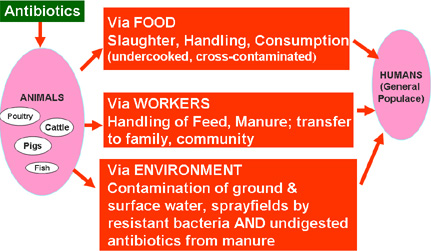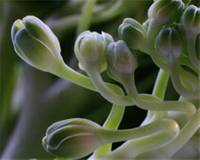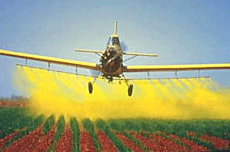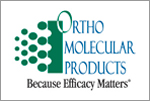- Fitness (19)
- News & Reviews (25)
- Nutrition (20)
- Science (10)
- Supplements (6)
- Technologies (8)
- The Arts (9)
Antibacterial Personal Care Products Are Linked to Allergies in Children
June 20th, 2012
 From Science Daily (June 19, 2012) This study gives us yet another reason to use more natural products! Cathie— Exposure to common antibacterial chemicals and preservatives found in soap, toothpaste, mouthwash and other personal-care products may make children more prone to a wide range of food and environmental allergies, according to new research from Johns Hopkins Children’s Center. Results of the NIH-funded study are published online ahead of print June 18 in the Journal of Allergy and Clinical Immunology.
From Science Daily (June 19, 2012) This study gives us yet another reason to use more natural products! Cathie— Exposure to common antibacterial chemicals and preservatives found in soap, toothpaste, mouthwash and other personal-care products may make children more prone to a wide range of food and environmental allergies, according to new research from Johns Hopkins Children’s Center. Results of the NIH-funded study are published online ahead of print June 18 in the Journal of Allergy and Clinical Immunology.
Using existing data from a national health survey of 860 children ages 6 to 18, Johns Hopkins researchers examined the relationship between a child’s urinary levels of antibacterials and preservatives found in many personal-hygiene products and the presence of IgE antibodies in the child’s blood. IgE antibodies are immune chemicals that rise in response to an allergen and are markedly elevated in people with allergies.
“We saw a link between level of exposure, measured by the amount of antimicrobial agents in the urine, and allergy risk, indicated by circulating antibodies to specific allergens,” said lead investigator Jessica Savage, M.D., M.H.S., an allergy and immunology fellow at Hopkins. Continue reading »
Antibiotic Resistance
September 16th, 2011

A Report from the Physicians Committee for Responsible Medicine: The growing public health threat of antibiotic resistance is almost entirely attributed to antimicrobial use in animal agriculture.
Animals raised for meat and dairy products are routinely treated with antibiotics to promote growth and reduce the risk of illnesses that would otherwise be common in crowded living conditions. Currently, 80 percent of antibiotics used in the United States are administered to animals on farms.
Widespread use of antibiotics can give rise to resistant bacteria, which may or may not cause disease in the animals. Through contact with farm workers and contaminated waste runoff, resistant bacteria can spread to humans and to other animals.
Bacteria can also transfer resistance traits to other strains and classes of bacteria.
So the fewer antibiotics we consume on a daily basis through animal products, the healthier we’ll be! — Cathie
Filed under Science | Comments Off on Antibiotic ResistanceBetter Than Broccoli?
September 4th, 2011
 By Dr. John Dempster: Broccoli is part of the powerhouse brassica family of vegetables. Broccoli contains important phytochemicals that are released when they’re chopped, chewed, fermented, cooked or digested. The substances are released then break down into sulphorophanes, indole-3-carbinol and D-glucarate, which all have a specific effect on detoxification.
By Dr. John Dempster: Broccoli is part of the powerhouse brassica family of vegetables. Broccoli contains important phytochemicals that are released when they’re chopped, chewed, fermented, cooked or digested. The substances are released then break down into sulphorophanes, indole-3-carbinol and D-glucarate, which all have a specific effect on detoxification.
Broccoli sprouts can actually provide more benefit than regular broccoli as they contain 20 times more sulfurophane. Add these to your salads and get creative with them in your meals.
What do Broccoli Sprouts have in common with Beet Root, Sea Vegetables, Dandelions, Flax Seeds, Lemons, Garlic, Artichokes, Tumeric & Apples? All are natural, powerful detoxifiers and simple to add to our daily diets!
Healing Properties of Broccoli Sprouts: Continue reading »
Filed under Nutrition | Comments Off on Better Than Broccoli?Apples & Onions & Pesticides
June 14th, 2011
 By Scott Hensley for NPR: Maybe you overlooked the U.S. Department of Agriculture’s yearly roundup of pesticides in foods released last month. It’s long and full of tongue-twisting chemicals — like tetrahdrophthalimide and pyraclostrobin — found on some popular produce.
By Scott Hensley for NPR: Maybe you overlooked the U.S. Department of Agriculture’s yearly roundup of pesticides in foods released last month. It’s long and full of tongue-twisting chemicals — like tetrahdrophthalimide and pyraclostrobin — found on some popular produce.
But the Environmental Working Group, an advocate for stricter pesticide controls, has crunched the numbers from that report and a bunch of others to come up with a guide for concerned shoppers.
There’s a “Dirty Dozen,” headlined by apples, celery and strawberries. And there’s also a catchy “Clean 15” of fruits and vegetables lowest in pesticides. The top three on that list: onions, sweet corn and pineapples.
The EWG suggests that people buy organically grown fruits and vegetables for the varieties on its list of the most likely to carry pesticide residues. But the group also says the health benefits from produce mean that “eating conventionally-grown produce is far better than not eating fruits and vegetables at all.” Continue reading »
Harvard: Coffee Cuts Cancer Risk
May 29th, 2011
 This article gives us reason to drink coffee, but I don’t recommend the six cups mentioned in the study — that much can cause other problems!
This article gives us reason to drink coffee, but I don’t recommend the six cups mentioned in the study — that much can cause other problems!
By Roni Caryn Rabin for the New York Times: If that’s java in your cup, drink up. A new study says that men who are heavy coffee drinkers are at lower risk for prostate cancer.
As part of the Health Professionals Follow-Up Study, Harvard scientists followed 47,911 men who periodically described their coffee intake. The researchers found those who consumed six or more cups a day were almost 20 percent less likely to develop prostate cancer over two decades than those who drank none.
More important, the heavy coffee drinkers were 60 percent less likely than the non-drinkers to develop a lethal form of the disease. Even men who drank just one to three cups of coffee benefited: They were nearly 30 percent less likely to develop lethal prostate cancer, the study said.
It did not matter whether the coffee was caffeinated or decaffeinated. (Remember that decaf is more acidic than regular, so regular makes sense for those with reflux or heartburn, or those trying to maintain an alkaline diet. With palpitations or a heart condition, decaf may be better.– Cathie) Continue reading »
Filed under Nutrition | Comments Off on Harvard: Coffee Cuts Cancer Risk



